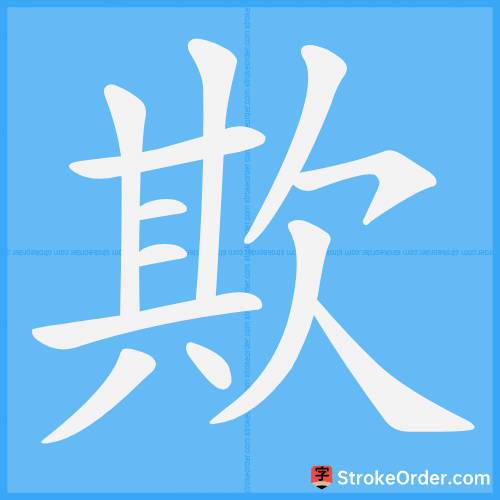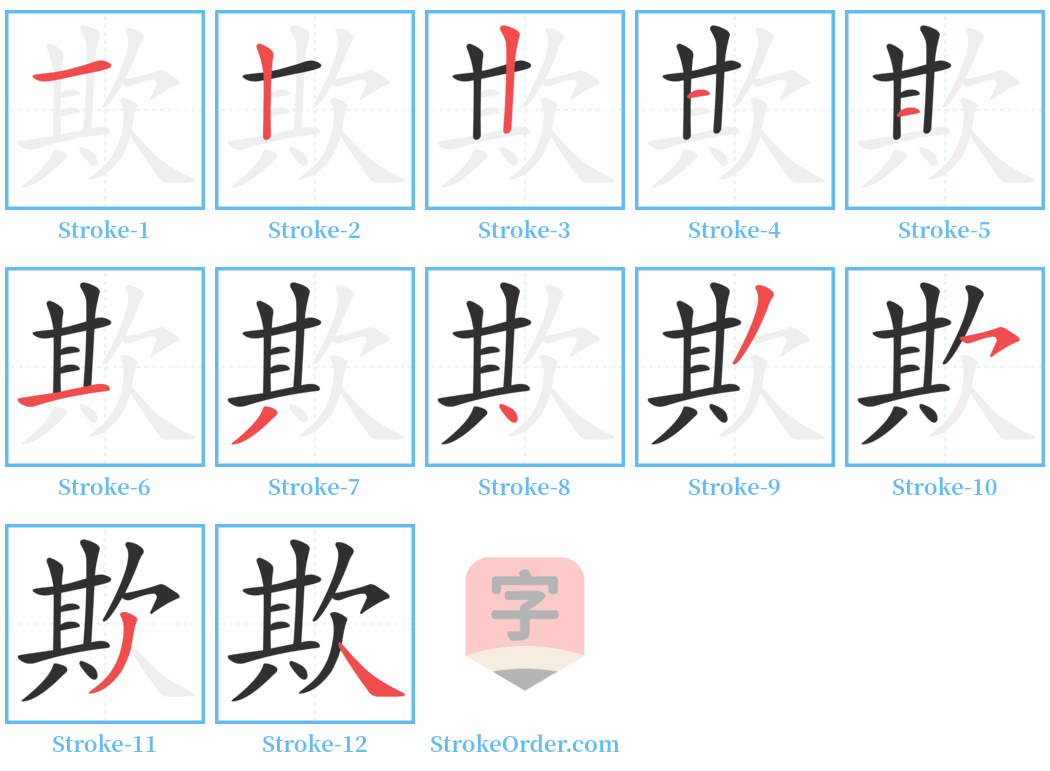欺 Stroke Order
Animated Stroke Order of 欺

Stroke Order Diagrams for 欺

Step-by-Step Handwriting Guide for 欺

Learn to Write Chinese Characters with Video Tutorials
Watch the video of writing the Chinese character "欺", learn the correct stroke order (笔顺) of the character "欺", and master the standard way of writing the character "欺".
Free Printable Handwriting Practice with Stroke Order: 欺
Printable Writing Practice Worksheet of "欺" in Portrait Orientation (Tian Zi Ge)

Printable Writing Practice Worksheet of "欺" in Landscape Orientation (Tian Zi Ge)

Information of 欺
Pinyin
qī
Radical
欠
Strokes
12 strokes
Usage
★★★★★
Definition
take unfair advantage of / to deceive / to cheat
欺 [qī]
1. (verb) Fraud, deception.
1. Fraud, deception: to cheat, to defraud, to deceive, to mislead, to slander, to deceive falsely, to trick; "童叟无欺" (No one is cheated, whether young or old).
2. (verb) Oppression, insult.
1. Oppression, insult: to oppress, to insult, to bully, to mistreat; "欺负" (to bully).
3. (verb) Deceive; cheat.
1. Same as original meaning ([En.] deceive; cheat).
4. (verb) Fraud, employing cunning and deceitful means to deceive ([En.] blackmail; fraud).
5. (verb) Oppression; bullying ([En.] bully).
引 (examples/quotations):
1. From "说文": "欺" means to deceive.
2. From "贾子道术": "仁义修立谓之任,反任为欺" (Establishing righteousness is called responsibility; doing the opposite is deceit).
3. From "京房易传": "禄不遂行兹谓欺" (If one's salary is not forthcoming, it is called deceit).
4. From "史记·廉颇蔺相如列传": "徒见欺" (Only to be seen as deceitful).
5. Example: "尚不相欺" (Still not deceiving each other).
6. Usage: "为欺也" (For being deceitful).
7. Example: "欺诳" (deceive and mislead); "欺上罔下" (to deceive those above and conceal the truth from those below); "欺天罔人" (to deceive heaven and people).
8. Example: "欺压" (to oppress) (唐·杜甫: "南村群童欺我老无力...").
形 (adjective):
1. From "列子·仲尼": "果若欺魄焉,而不可与接" (As if to deceive the spirit, and thus cannot be engaged with).
cheating neither old nor young (idiom); treating youngsters and old folk equally scrupulously / Our house offers sincere treatment to all and fair trade to old and young alike.
to cheat strangers / to bully strangers / (of domesticated animals) to be rebellious with unfamiliar people
conceal the true state of affairs from above and below oneself / bully those below one and hoodwink those above / deceive one's superiors and delude one's subordinates
Input Method for 欺
Pinyin
qi1
Wubi
adww|dwqw
Cangjie
tcno
Zhengma
ecro
Four Corner
47882
Unicode
U+6b3a
Same Pronunciation Characters